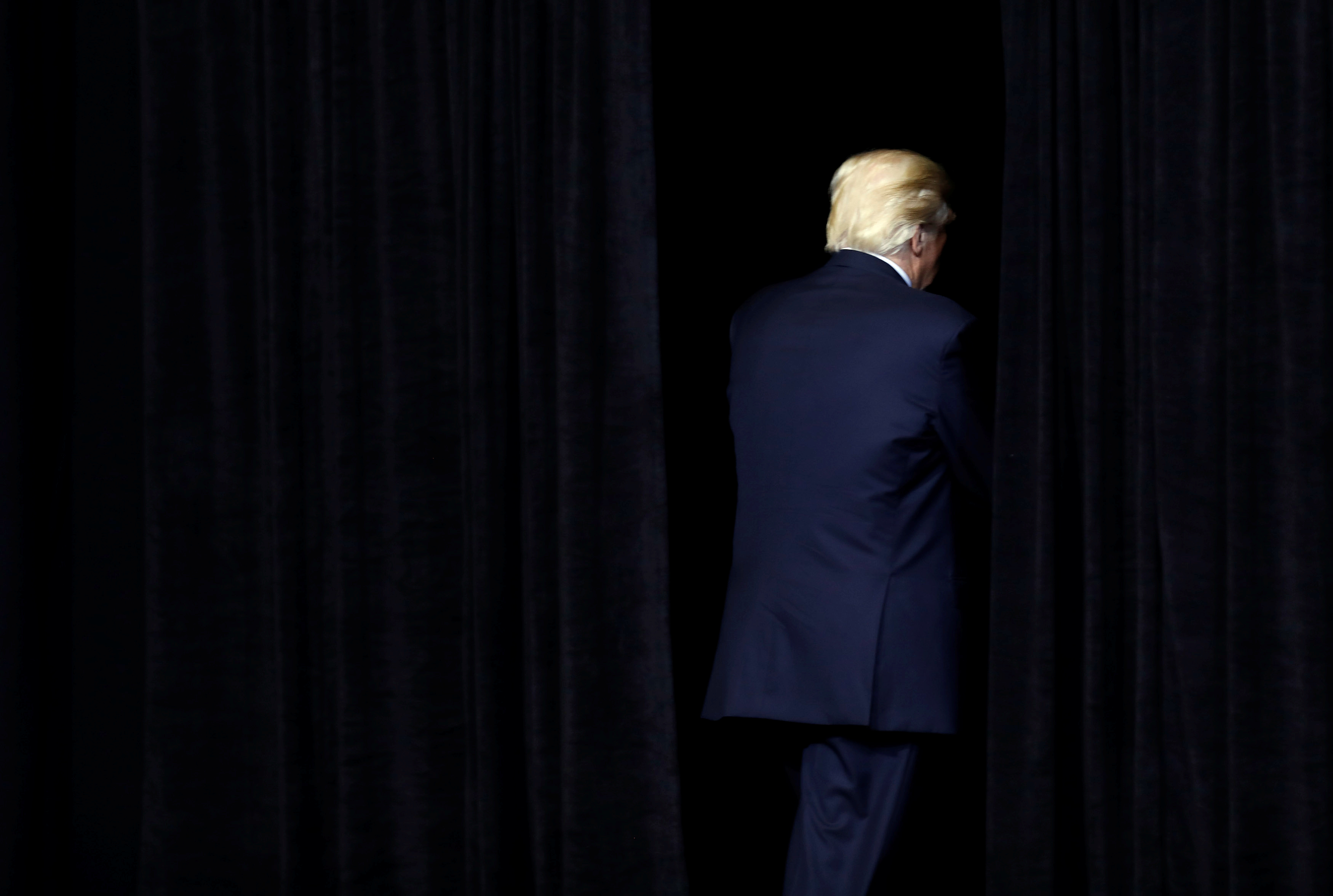How Trump abandoned populism
Trump promised to be a new kind of Republican. What happened?


A free daily email with the biggest news stories of the day – and the best features from TheWeek.com
You are now subscribed
Your newsletter sign-up was successful
Conservatives inclined to cheer major tax-cut legislation even if it's signed by a president they don't particularly care for are frustrated by its unpopularity. They blame the media and Democrats for torquing up class warfare. In effect, they ask, don't you know you'll get a tax cut, too?!
Here is an alternative explanation: Working- and middle-class voters don't much care that they might get a (temporary) tax cut. The problem is, when they hear Republicans touting the magic of cuts, they smell a rat. They've been hearing the same rhetoric for 40 years, and they know the fix is in. They suspect that the wealthiest Americans stand to gain the most — and they would be right.
It didn't have to be this way.
The Week
Escape your echo chamber. Get the facts behind the news, plus analysis from multiple perspectives.

Sign up for The Week's Free Newsletters
From our morning news briefing to a weekly Good News Newsletter, get the best of The Week delivered directly to your inbox.
From our morning news briefing to a weekly Good News Newsletter, get the best of The Week delivered directly to your inbox.
In fact, Donald Trump, the candidate, promised the country a different way, a different kind of Republicanism; he promised a kind of radical-center populism. Candidate Trump entertained the idea of raising taxes on the wealthy, including himself. As late as this past September, he signaled a commitment to eliminating the carried-interest loophole for hedge fund and private equity managers. As late as this past March, there was still talk of breaking up the big banks and reinstating Glass-Steagall legislation. He says he still wants an infrastructure bill — but the deficits caused by these tax cuts (estimates vary from $500 billion to $1 trillion over the next 10 years, depending on how much growth they stimulate and, conversely, how much easier it becomes to game the tax code) will make it hard to find money for new spending.
President Trump could've turned Washington, D.C., on its head. The conventional wisdom about the grand bargain between Trump and the Republican establishment is that they will tolerate his antics and flagrant corruption in exchange for his signing their agenda into law. But Trump could've struck an entirely different bargain than the one he's wedded to now — the one that has him and his congressional allies both mired in approval ratings that are astonishingly low given economic conditions.
Truth be told, this Bizarro Trump bargain would've looked something like the departed Stephen Bannon's vision of a Trumpian New Deal that mingled a tougher line on global trade with new spending on infrastructure and higher income taxes on the wealthy, underwritten by the angst of older whites and social conservatives. Economic populism plus cultural traditionalism. Bannon's bluster about a new nationalist governing majority for the next 50 years aside, one must admit it's not impossible to imagine Trump, having made the Rust Belt voters who delivered him the presidency his highest priority, striking bipartisan deals that, say, lowered the corporate tax rate but left Obama-era income brackets alone. Or new infrastructure spending offset by tax-code simplification and base-broadening.
Trump's bargain to Republicans would've been difficult but irresistible: If you want your judges, then you have to swallow my bargains with Chuck and Nancy. Would this Trump possibly be even less popular than the one we've got now? I highly doubt it. Trumpian triangulation that courted evangelicals on culture and Democrats on economic policy would, in addition to being more popular with the actual voting public, also have found a more congenial audience with a largely centrist media that positively hungers for bipartisan breakthroughs.
A free daily email with the biggest news stories of the day – and the best features from TheWeek.com
Instead of this Bizarro Trump, we have the worst of all possible worlds. We have the kleptocracy and the autocracy: the self-dealing corruption of the Trump Organization, the norm-crushing attacks on the free press, the eye-winking approval of strongmen in Turkey, Russia, Saudi Arabia, and the Philippines. And we have the absolute worst aspects of generic corporatist conservatism: an obsequiously lax regulatory environment for banks and the energy industry, plus a tax windfall for the wealthy that will make it harder to fight the next recession and easier to justify the next attempt to cut social spending. And instead of the sliver of Bannonism that held true political appeal, we're left with the hard edges of alt-right racialism and Roy Moore-style outrageousness.
Enjoy, for the moment, your holiday break and your Rose Garden signing ceremony, Republicans. And when you reap the whirlwind in 2018 and beyond, remember what I told you: It could've been different.
Scott Galupo is a freelance writer living in Virginia. In addition to The Week, he blogs for U.S. News and reviews live music for The Washington Post. He was formerly a senior contributor to the American Conservative and staff writer for The Washington Times. He was also an aide to Rep. John Boehner. He lives with his wife and two children and writes about politics to support his guitar habit.
-
 Why the Bangladesh election is one to watch
Why the Bangladesh election is one to watchThe Explainer Opposition party has claimed the void left by Sheikh Hasina’s Awami League but Islamist party could yet have a say
-
 The world’s most romantic hotels
The world’s most romantic hotelsThe Week Recommends Treetop hideaways, secluded villas and a woodland cabin – perfect settings for Valentine’s Day
-
 Democrats push for ICE accountability
Democrats push for ICE accountabilityFeature U.S. citizens shot and violently detained by immigration agents testify at Capitol Hill hearing
-
 The billionaires’ wealth tax: a catastrophe for California?
The billionaires’ wealth tax: a catastrophe for California?Talking Point Peter Thiel and Larry Page preparing to change state residency
-
 Bari Weiss’ ‘60 Minutes’ scandal is about more than one report
Bari Weiss’ ‘60 Minutes’ scandal is about more than one reportIN THE SPOTLIGHT By blocking an approved segment on a controversial prison holding US deportees in El Salvador, the editor-in-chief of CBS News has become the main story
-
 Has Zohran Mamdani shown the Democrats how to win again?
Has Zohran Mamdani shown the Democrats how to win again?Today’s Big Question New York City mayoral election touted as victory for left-wing populists but moderate centrist wins elsewhere present more complex path for Democratic Party
-
 Millions turn out for anti-Trump ‘No Kings’ rallies
Millions turn out for anti-Trump ‘No Kings’ ralliesSpeed Read An estimated 7 million people participated, 2 million more than at the first ‘No Kings’ protest in June
-
 Ghislaine Maxwell: angling for a Trump pardon
Ghislaine Maxwell: angling for a Trump pardonTalking Point Convicted sex trafficker's testimony could shed new light on president's links to Jeffrey Epstein
-
 The last words and final moments of 40 presidents
The last words and final moments of 40 presidentsThe Explainer Some are eloquent quotes worthy of the holders of the highest office in the nation, and others... aren't
-
 The JFK files: the truth at last?
The JFK files: the truth at last?In The Spotlight More than 64,000 previously classified documents relating the 1963 assassination of John F. Kennedy have been released by the Trump administration
-
 'Seriously, not literally': how should the world take Donald Trump?
'Seriously, not literally': how should the world take Donald Trump?Today's big question White House rhetoric and reality look likely to become increasingly blurred
